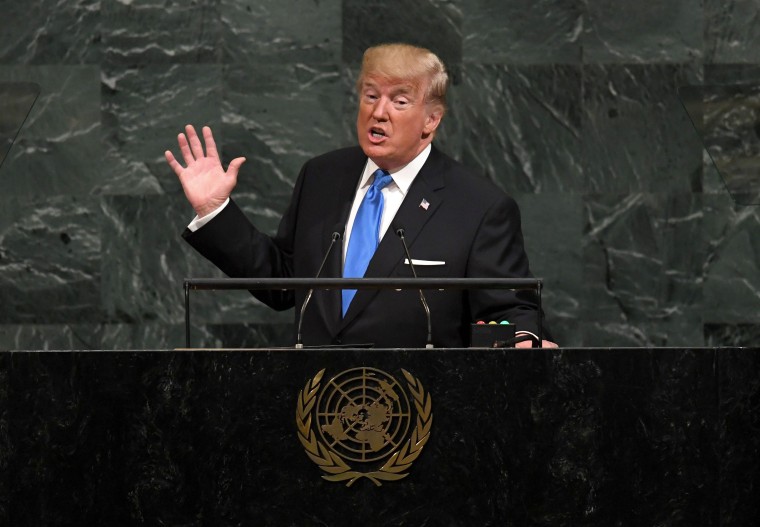Donald Trump's first speech to the United Nations General Assembly last week was a unique opportunity. The American president has quickly become the target of international mockery and derision, and many observers around the world see the television-personality-turned-politician as a ridiculous buffoon, incapable of leadership, statesmanship, and diplomacy.
But if Trump's address was an opportunity to chart a new course, he blew it. The speech not only included juvenile taunts, as if this were another one of the president's self-indulgent red-state rallies, but it served as a reminder that Trump's foreign policy vision is increasingly incoherent.
As the Washington Post's E.J. Dionne put it, the president's speech "was supposed to be a serious formulation of the president's grand strategy in the world ... but every effort Trump made to build an intellectual structure to support it only underscored that his favored phrase was either a trivial applause line or an argument that, if followed logically, was inimical to the United States' interests and values."
The remarks were so plainly absurd that some White House aides apparently told the L.A. Times that Trump ignored their advice before delivering it.
Senior aides to President Trump repeatedly warned him not to deliver a personal attack on North Korea's leader at the United Nations this week, saying insulting the young despot in such a prominent venue could irreparably escalate tensions and shut off any chance for negotiations to defuse the nuclear crisis.Trump's derisive description of Kim Jong Un as "Rocket Man" on "a suicide mission" and his threat to "totally destroy" North Korea were not in a speech draft that several senior officials reviewed and vetted Monday, the day before Trump gave his first address to the U.N. General Assembly, two U.S. officials said.Some of Trump's top aides, including national security advisor H.R. McMaster, had argued for months against making the attacks on North Korea's leader personal, warning it could backfire.
But Trump, the L.A. Times article added, "felt compelled to make a dramatic splash in the global forum."
If this sounds vaguely familiar, it's because we've seen this dynamic unfold before.
In June, ahead of Trump's address to NATO leaders, National Security Adviser H.R. McMaster, Defense Secretary James Mattis, and Secretary of State Rex Tillerson spent weeks lobbying behind the scenes, fighting to ensure that the president would explicitly endorse the core principle at the heart of the alliance: the Article 5 guarantee that an attack on one NATO country would represent an attack on every member.
The three were pleased when they thought they'd improved the written remarks -- and were then blindsided when they heard Trump's remarks, and the language they included wasn't there. According to Politico's reporting at the time, it was the president himself who "deleted" the language McMaster, Mattis, and Tillerson wanted.
Three months later, there was the speech senior officials "reviewed and vetted" for the United Nations, which adopted a more measured tone, and then there was the speech Trump delivered, which included juvenile references to "Rocket Man."
It's worth pausing, of course, to acknowledge various officials' motivations. In the wake of a poorly received speech, it stands to reason that some in the White House would quietly leak word that the disaster wasn't their fault. The old expression about "failure being an orphan" comes to mind.
That said, it's also very easy to believe that some of the more responsible voices in the Trump administration -- I'm admittedly grading on a curve here -- have tried to guide the president to follow a more mature path, only to discover that their petulant boss ultimately doesn't care what they want.
For all of those hoping that the grown-ups in Trump's orbit will help prevent the president from doing anything too outrageously dangerous, stories like these are more than a little discouraging.
Postscript: For more analysis of Trump's U.N. speech, I'd recommend pieces from Fred Kaplan and David Rothkopf.
